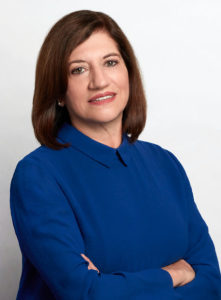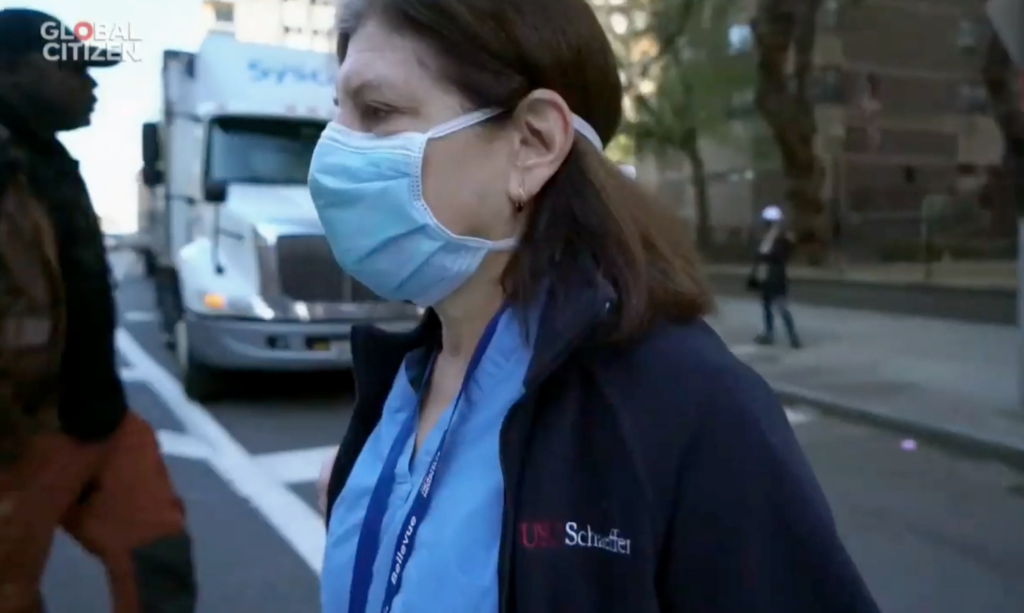With the COVID-19 pandemic costing lives and challenging the nation’s healthcare systems, Judy Salerno knew it was time to trade her executive suits for scrubs.
President of the New York Academy of Medicine (NYAM), Salerno refused to just watch on the sidelines as her city became the nation’s epicenter of COVID-19. As a physician retired from clinical practice with a specialty in geriatrics, she joined fellow volunteers at the front lines of the crisis in New York City.
For the past five weeks Salerno, who also serves on the Schaeffer Center Advisory Board, spent her days at Bellevue Hospital, the oldest public hospital in the U.S. — and a key safety-net hospital for the city. There, she assisted intensive care unit (ICU) teams in managing communications about patients with their families.
The sheer number of coronavirus victims, many of whom were on ventilators, was shocking she said. “We were dealing with the most critically ill patients,” she explained. To make matters worse, the ICU was often over capacity, with patients doubled up in rooms or moved into makeshift overflow areas.
Adding to the stress was the rapid decline in patients’ health. Many would go from walking into the emergency room on their own to being unconscious and intubated, with their families unable to see them and little time to develop care plans or end-of-life preferences. “In one weekend alone, seven patients on our service died,” she said.
“We were the only connection they had to what was happening with their loved one. I would schedule video calls with them, often with the aid of an interpreter, to give them updates and try to bridge that gap,” Salerno says. “It made for a very different, very sad patient-family-doctor relationship.”
 Pressures and Inequities
Pressures and Inequities
Volunteering at a safety-net hospital led Salerno to reflect on what this crisis has revealed about the nation’s healthcare system.
With degrees in clinical medicine and public health, Salerno has a unique appreciation of population-wide issues as well as clinical challenges. At NYAM, she develops strategies to improve health for communities and individuals.
“The strain that is happening on an already strained safety-net system speaks to what happens when we don’t invest — and actively de-invest — in our safety-net health systems and the public health system,” she said. “There were great attempts to try and keep a level playing field for the patients, but there is no denying the distribution of scarce and valuable resources was inequitable across the city.”
Growing data about COVID-19 shows that the virus disproportionately affects African American and Latino communities. “I saw in full display the inequities in health outcomes and how unfair the system is for communities who are disadvantaged,” said Salerno.
While it is unclear what is driving the disparities in COVID-19 outcomes, Salerno pointed to broader issues at play. “These patients live in communities where there was been historic disinvestment, little infrastructure and everything was stacked against them,” she explained. “It really shows so clearly how this is much more complicated than whether or not you can get medical care.”
Salerno told stories of families telling her to give their loved one whatever care or medicine they required, emphasizing that they would figure out a way to pay for it later. “It was heartbreaking,” she said. “These communities have come to expect that they will get the short end of the stick, that the care they get won’t be as good because of their insurance or income status. What does that say about this country?”
As the virus continues to spread, policymakers across the nation are grappling with the economic consequences of continuing the shutdown versus public health risks. Salerno hopes they will focus on systematic data collection and resource allocation, and devise better policies for equitable distribution of scarce resources — with research centers like the Schaeffer Center positioned to help.
“We have to think about issues of access and value now,” she said, reflecting on the experience. “I hope that the world that my children will inherit will be much more prepared for inevitable challenges like this.”
Main image photo credit: The New York Academy of Medicine/Global Citizen

You must be logged in to post a comment.